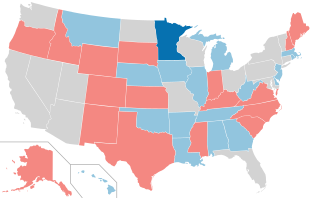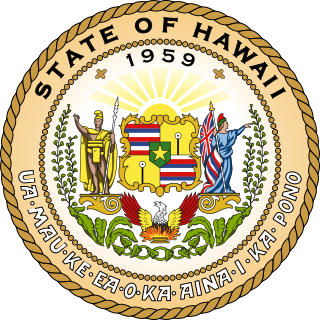| |||||||||||||||||
| |||||||||||||||||
 County results Akaka: 70–80% | |||||||||||||||||
| |||||||||||||||||
| Elections in Hawaii |
|---|
 |
The 1994 United States Senate election in Hawaii was held November 8, 1994. Incumbent Democratic U.S. Senator Daniel Akaka won re-election to his first full term.
| |||||||||||||||||
| |||||||||||||||||
 County results Akaka: 70–80% | |||||||||||||||||
| |||||||||||||||||
| Elections in Hawaii |
|---|
 |
The 1994 United States Senate election in Hawaii was held November 8, 1994. Incumbent Democratic U.S. Senator Daniel Akaka won re-election to his first full term.
| Party | Candidate | Votes | % | |
|---|---|---|---|---|
| Democratic | Daniel Akaka (Incumbent) | 256,189 | 71.78% | |
| Republican | Maria Hustace | 86,320 | 24.16% | |
| Libertarian | Richard Rowland | 14,393 | 4.03% | |
| Majority | 356,902 | |||
| Turnout | ||||
| Democratic hold | ||||

Since Hawaii became a state in 1959, it has sent congressional delegations to the United States Senate and United States House of Representatives. Each state elects two senators to serve for six years. Members of the House of Representatives are elected to two-year terms, one from each of Hawaii's congressional districts. Before becoming a state, the Territory of Hawaii elected a non-voting delegate at-large to Congress from 1900 to 1958.

Daniel Kahikina Akaka was an American educator and politician who served as a United States Senator from Hawaii from 1990 to 2013. He was a member of the Democratic Party.

Edward Espenett Case is an American lawyer and politician. A member of the Democratic Party, he has served as the U.S. representative for Hawaii's 1st congressional district since 2019, which covers the urban core of Honolulu. He represented the 2nd district, which covers the rest of the state, from 2002 to 2007.

Mazie Keiko Hirono is an American lawyer and politician serving since 2013 as the junior United States senator from Hawaii. A member of the Democratic Party, Hirono previously served as a member of the United States House of Representatives for Hawaii's 2nd congressional district from 2007 to 2013. Hirono also served as a member of the Hawaii House of Representatives from 1981 to 1995 and as Hawaii's tenth lieutenant governor from 1994 to 2002, under Ben Cayetano. She was the Democratic nominee for governor of Hawaii in 2002, but lost to Republican Linda Lingle.

The Native Hawaiian Government Reorganization Act of 2009 S1011/HR2314 was a bill before the 111th Congress. It is commonly known as the Akaka Bill after Senator Daniel Akaka of Hawaii, who proposed various forms of this bill after 2000.

The 1994 United States Senate elections were held November 8, 1994, with the 33 seats of Class 1 contested in regular elections. Special elections were also held to fill vacancies. The Republican Party took control of the Senate from the Democrats. Like for most other midterm elections, the opposition, this time being the Republicans, held the traditional advantage. The congressional Republicans campaigned against the early presidency of Bill Clinton, including his unsuccessful healthcare plan. Democrats held a 56–44 majority, after having lost a seat in Texas in a 1993 special election.

The 1990 United States Senate elections were held on Tuesday, November 6, 1990, with the 33 seats of Class 2 contested in regular elections. Special elections were also held to fill vacancies. The Democratic Party increased its majority with a net gain of one seat from the Republican Party. The election cycle took place in the middle of President George H. W. Bush's term, and as with most other midterm elections, the party not holding the presidency gained seats in Congress. This was the first time since 1980 that any party successfully defended all their own seats, and the first time Democrats did so since 1958.

The 1988 United States Senate elections were elections for the United States Senate. Held on November 8, 1988, the 33 seats of Class 1 were contested in regular elections. In spite of the Republican victory by George H. W. Bush in the presidential election, the Democrats gained a net of 1 seat in the Senate. 7 seats changed parties, with 4 incumbents being defeated. The Democratic majority in the Senate increased by one to 55–45.

The 2006 United States Senate election in Hawaii was held November 7, 2006. Incumbent Democrat Daniel Akaka won re-election to his third full term.

Brian Emanuel Schatz is an American educator and politician serving as the senior United States senator from Hawaii, a seat he has held since 2012. A member of the Democratic Party, Schatz served in the Hawaii House of Representatives from 1998 to 2006, representing the 25th legislative district; as the chairman of the Democratic Party of Hawaii from 2008 to 2010; and as the 12th lieutenant governor of Hawaii from 2010 to 2012.

Colleen Wakako Hanabusa is an American lawyer and politician who served as the U.S. representative for Hawaii's 1st congressional district from 2011 to 2015 and again from 2016 to 2019. A member of the Democratic Party, she ran for her party's nomination for governor of Hawaii in 2018, challenging and losing to incumbent and fellow Democrat David Ige.

The 2010 United States Senate election in Hawaii took place on November 2, 2010, concurrently with elections to the United States Senate in other states as well as elections to the United States House of Representatives and various state and local elections. The primary elections were held on September 18, 2010. Incumbent Senator Daniel Inouye, also the President pro tempore, secured the Democratic nomination with over 88 percent of the vote over his sole challenger, businessman Andy Woerner, while former state legislator Campbell Cavasso won the Republican nomination with two-thirds of the primary vote.

The 1990 United States Senate special election in Hawaii took place on November 4, 1990. Incumbent Democratic U.S. Senator Daniel Akaka was elected to finish the term ending in 1995. He had been appointed by Governor John Waihee in April 1990 to serve temporarily after the death of Spark Matsunaga. This was the best Republican performance in a U.S. Senate race in Hawaii where the Democrat won since Hiram Fong retired in 1976.

The 2000 United States Senate election in Hawaii took place on November 7, 2000. Incumbent Democratic U.S. Senator Daniel Akaka won re-election to his second full term.

The 1988 United States Senate election in Hawaii took place on November 8, 1988. Incumbent Democratic U.S. Senator Spark Matsunaga won re-election to a third and final term.

The 2012 United States Senate election in Hawaii took place on November 6, 2012, concurrently with the 2012 U.S. presidential election, as well as other elections to the United States Senate and House of Representatives and various state and local elections. Incumbent Democratic senator Daniel Akaka decided to retire instead of seeking a fourth full term. Democrat Mazie Hirono defeated Republican Linda Lingle in a rematch of Hawaii's 2002 gubernatorial election. This was the first open Senate seat in the state of Hawaii since 1976.

Hawaii's 2012 general elections were held on November 6, 2012. Primary elections were held on August 11, 2012.

The 2016 United States Senate election in Hawaii was held November 8, 2016, concurrently with the 2016 U.S. presidential election as well as other elections to the United States Senate and House of Representatives and various state and local elections. The primaries were held August 13. Incumbent Democratic U.S. Senator Brian Schatz won reelection to his first full term in office, defeating Republican former state legislator John Carroll.

The 2014 United States Senate special election in Hawaii took place on November 4, 2014, the general Election Day in the United States, concurrently with other elections to the United States Senate in other states as well as elections to the United States House of Representatives and various state and local elections.

Esther Puakela Kiaʻāina is a Native Hawaiian politician who currently serves on the Honolulu City Council as its Vice Chair and represents District 3 on the island of Oʻahu. She was elected on November 3, 2020, and began her tenure on January 2, 2021. She is Chair of the Planning and the Economy Committee and Vice Chair of the Committee on Housing, Sustainability, and Health.
{{cite web}}: CS1 maint: archived copy as title (link)